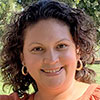How I Won My First Artist Grant
Sarah Dalton | January 2019
AWP celebrates the Writer to Writer participants of Fall 2018. We invited mentors and mentees to share their recent experiences in the mentorship program.

How would you like to have $600 to attend a conference? Yeah, I know, hard to pass up, which is exactly why I clicked on the newsletter from California-based Center for Cultural Innovation (CCI). I’d learned about and signed up for CCI updates after attending a class about the business of writing with Lyzette Wanzer at the San Francisco Writers’ Grotto. We worked on our artist statements, LinkedIn profiles, and researching opportunities. Lyzette also recommended a book by Gigi Rosenberg, The Artist’s Guide to Grant Writing, which I found at my local library.
In her book, Rosenberg walks artists through the common pieces of a grant application: project proposal, budget, resume, artist statement, etc. Additionally, Rosenberg discusses the not-so-obvious aspects of grant writing, such as having a support team, making yourself stand out from the crowd, and analyzing the guidelines in your favor.
I clicked the newsletter link to the CCI website and downloaded the Quick Grant Guidelines. I read and reread that PDF so many times to ensure my eligibility and that of my activity: attending the AWP Portland conference in 2019. CCI Quick Grants fund California-based artists (previously only LA- and San Francisco Bay Area-based artists, but they have recently expanded to include any artist living in California) who want to participate in professional development opportunities such as attending a conference or working with a consultant.
My situation fit the grant criteria perfectly. CCI prioritizes applicants like me who have not already received a Quick Grant. I lived in the San Francisco Bay Area and wanted to attend a high-profile conference. Additionally, I knew that being in the Writer to Writer Mentorship Program would help my application stand out.
The four components of the Quick Grant application include a 100-word activity description, a 200-word statement about potential career impact, a budget, and a resume. When I told my mentor, Alex Lemon, about the grant application, he was excited and open to offering feedback before I submitted.
I completed a few drafts and sent Alex my fourth, which I thought was awesome. For the activity description, I included only three specifics about #AWP19: the Writer to Writer mixer, the Latino Caucus, and Colson Whitehead’s keynote speech. In other words, for a four-day conference I only had about five hours planned. If you include my four-hour volunteer stint, nine. The proposed career impact was a little better. I stole my favorite language, like “foster community,” from AWP’s mission statement. I also wrote that I wanted to geek out at the Bookfair. (Note: I didn’t use the term “geek out”; I used the vague phrase “attend the Bookfair” instead). For my budget, I included that my Airbnb cost would be split with a friend and that the registration fee was covered with four hours of volunteering at the conference. My request for money was clear and specific: flight and lodging. I felt confident that the grant committee would see that I was eager, frugal, and serious.
And then came Alex’s feedback. He appreciated statements with clear and concise language, like “I am requesting a Creative Capacity Quick Grant,” and said my budget was well thought out. He made suggestions for stronger word choices, highlighted spelling errors (I had misspelled Colson as “Coleson”) and pointed out sentences where the language could be condensed and read more streamlined. He asked great questions to push my planning. What did I want to see or learn at the Bookfair? What specific panels did I want to hear?
With Alex’s input, I did more research and strengthened my application with specifics, even finding two panels he was going to be on, “Writing the Body” and “Poetry and the Body.” My mentor asked the best questions to get me to think deeper and more precisely. He helped wrangle my lengthy prose and revamp my resume.
The application solidified, and when I sent it out, I felt proud of both the thinking and writing I’d done to make a great application. I knew that even if I didn’t get the grant, I’d learned a lot from Lyzette, Rosenberg’s book, and Alex about how to make my application provoke enthusiasm from the grant committee.
One month later, I received another email from the Center for Cultural Innovation. “Dear Sarah,” it read, “Congratulations! Your application has been approved to receive a Quick Grant Award.”
 Sarah Dalton was born and raised in the San Francisco East Bay where she has been a high school teacher for twelve years. Her work has been published in the “Readers Write” section of The Sun and in River Teeth’s weekly column Beautiful Things. She is a second-year student in the MFA program at San Jose State University, and in January 2019 attended her first artistic residency at Hypatia-in-the-Woods. She enjoys belting out songs from Moana, playing “Star Wars” with her 4- and 6-year-old sons, and exploring Northern California with her husband and family.”
Sarah Dalton was born and raised in the San Francisco East Bay where she has been a high school teacher for twelve years. Her work has been published in the “Readers Write” section of The Sun and in River Teeth’s weekly column Beautiful Things. She is a second-year student in the MFA program at San Jose State University, and in January 2019 attended her first artistic residency at Hypatia-in-the-Woods. She enjoys belting out songs from Moana, playing “Star Wars” with her 4- and 6-year-old sons, and exploring Northern California with her husband and family.”
